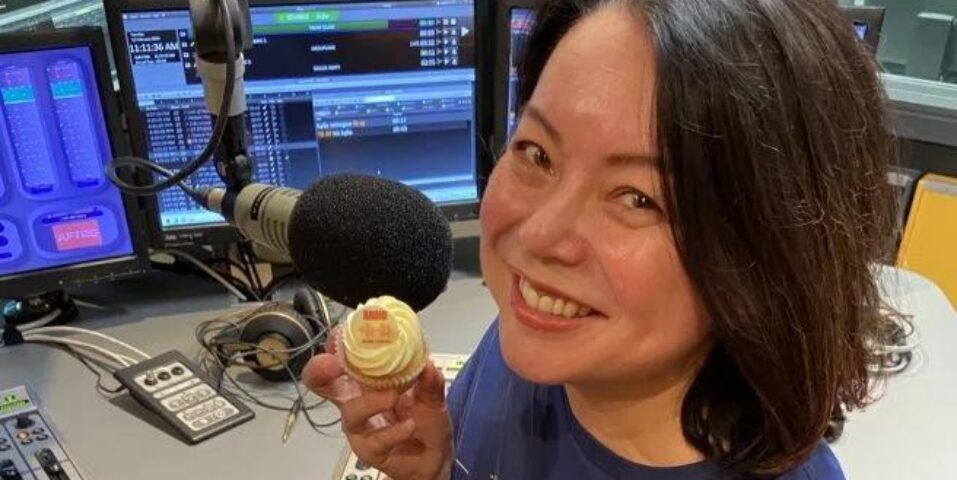Today is World Radio Day. In conversation with RadioInfo, Andrea Ho, pictured above with a #WorldRadioDay cupcake, shares how ubiquitous radio is in our daily lives.
“Radio and now podcasting are very much in our lives right now – most Australians listen to some audio every week,”
We reached our Radio and Podcasting experts, and asked Natalie Pozdeev (Program Convenor, Graduate Diploma in Radio and Podcasting) and Andrea Ho (Discipline Lead, Radio and Podcasting) to help us celebrate by sharing their favourite insights about this medium.
Whether commuting by car or train, working, or simply enjoying leisure time, we go along our days listening to the comforting voice of our radio, connecting through a shared music taste, an interest in a particular field of information or conversations from close and afar, ranging from politicians to our neighbours or our favourite celebrities.
Radio is a vibrant network across public, commercial, and regional sectors, widely accessible and connecting with 99,7% of Australians, reaching remote communities through owned and operated local communities.
This medium has been the staple for sharing news, breaking essential and fact-checked information faster than the internet and combining an understanding of local and global needs.
Essential in building our local networks, radio is vital for Australian storytelling and identity through music, conversation, and a shared sense of community. So, here are some fascinating stats about radio.
Australian radio is unique and amazing:
- Australia’s unique radio landscape is studied by people from all around the world, thanks to its strong public, commercial, and community sectors.
- Radio is accessible by 99.7% of Australians
- Over 97% of people in greater Sydney (over the age of 10) listen to radio each week
- The total number of radio listeners in Australia continues to rise
- Radio covers Australia’s vast distances and connects our city, regional, and remote communities
“Radio actually does have a lot of jobs if you’re willing to work in the regions. There are heaps of opportunities out there in news, announcing and producing.”
AFTRS student Gareth Thomson shares insights about his journey from theatre to work as weekday afternoon newsreader on Wollongong’s Wave FM.
Radio is important for news and information:
- During bushfires or other emergencies, radio has been the most reliable and accessible platform with thousands of hours of emergency information broadcasted each year.
- Radio breaks news as fast (or faster) than the internet, with ~470 journalists working to fact check and get the news out, and report on local stories
- The outpouring of radio content is staggering, with over 50,000 hours broadcast per week.
- Localism and local news represent over 50,000 hours of Australian news every year
- Radio is of extreme importance for regional Australia with over 2m hours of local regional content every year
Radio stations in every region play a vital role in providing timely and accurate information to their local communities. Such stations are instrumental in building strong community ties through direct relationships.
Kimmi Saker, an alumna of AFTRS and the host of 2EC for almost 30 years, recalls the critical moment when bushfires struck her local community. “I went on air at 6 am and we told people to head for the beach. From that day we were in emergency mode.”
Radio is important for language:
- Content is made each week in 100+ languages across Australia, celebrating our many cultures and helping people stay connected to their roots but also settle into Australian life
- Radio is also important in maintaining language, with remote Indigenous broadcasters broadcasting in language, teaching young ones (over 150 radio services for Aboriginal and Torres Strait Islander people, the vast majority owned and operated by community)
- For listeners with language disadvantage, including vision impairment and literacy challenges, radio provides access to written information
AFTRS student Dr Angela Tjeuw shares how ABC was fundamental in her language and cultural understanding of Australia after moving in with her parents.
“The reason I chose radio was because Mum always had the ABC on in the car and, going back and forth to school, I’d hear all these voices on the radio. That was my way of connecting to Australia.”
Radio is important for society:
- Australian stories told every week, by and for Australians, including:
- Young people from the age of 10
- Older people in their 90s
- People with disabilities
- First Nations communities
- Refugee and immigrant communities
- Radio provides education, knowledge and learning to all ages from children to adults
- Connecting millions of people every week
- The radio industry employs ~10,000 people across Australia
- The number of unique radio services offered across Australia is close to ~800
“I had one plan, and it was to be on the Kyle and Jackie O show. My dad said, ‘you’ve got six months to get a full job.’ I said, ‘I’ll give you three and I’m on the show.’ I shook his hand and in three months I was on the show. To do it by 21 is amazing.”
Alfie Laguzza, currently studying the Graduate Diploma of Radio and Podcasting at AFTRS is one of the listeners turned practitioners from the young Australian generation engaged with radio and broadcasting.
With its unparalleled reach, radio is an essential conduit for storytelling, education, and culture, reflecting and shaping our society and echoing narratives that connect our community.
